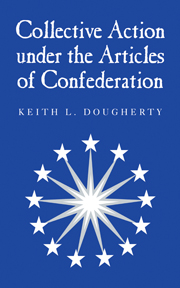Book contents
- Frontmatter
- Contents
- List of Tables and Figures
- Acknowledgments
- 1 The Mystery of State Contribution
- 2 National Interests and State Sovereignty: Objectives of the Confederation
- 3 Collective Action and the Provision of Public Goods
- 4 The History of State Compliance
- 5 State Contributions and Private Interests
- 6 Reacting to Rebellion
- 7 A New Constitution
- 8 Conclusion
- Appendix: Olson's Collective Action Game
- Glossary
- References
- Index
8 - Conclusion
Published online by Cambridge University Press: 15 October 2009
- Frontmatter
- Contents
- List of Tables and Figures
- Acknowledgments
- 1 The Mystery of State Contribution
- 2 National Interests and State Sovereignty: Objectives of the Confederation
- 3 Collective Action and the Provision of Public Goods
- 4 The History of State Compliance
- 5 State Contributions and Private Interests
- 6 Reacting to Rebellion
- 7 A New Constitution
- 8 Conclusion
- Appendix: Olson's Collective Action Game
- Glossary
- References
- Index
Summary
We are told that the Confederation carried us through the war. Had not the enthusiasm of liberty inspired us with unanimity, that system would never have carried us through it.
– John MarshalAfter enacting the Constitution the American Revolution had run its course. In less than twenty years, Americans had moved from a principled opposition to centralized government to a new constitution that strengthened centralized power. They secured independence from Great Britain, experimented with a confederation of independent republics, and were now ready to jump into a new form of democracy that had never been tried before. They planned an enormous republic that would encompass the diverse interests of the Massachusetts merchant and the Georgia frontiersman, the New Hampshire craftsman and the Virginian gentry. As no other republic had done before, government under the Constitution would now represent both the people and the states and allow state and national governments to coexist in different spheres. “The federal Constitution forms a happy combination in this respect,” wrote Madison, “the great and aggregate interests being referred to the national, the local and particular to the State.” The idea was radical, and it seemed to work against the initial goal of protecting state sovereignty. Few would have risked it without experiencing the failures of the confederation.
The American confederation is rich with stories about the formation of a nation. Although every good story is worth retelling, my intent has not been to retell the story of the American confederation.
- Type
- Chapter
- Information
- Collective Action under the Articles of Confederation , pp. 162 - 182Publisher: Cambridge University PressPrint publication year: 2000



